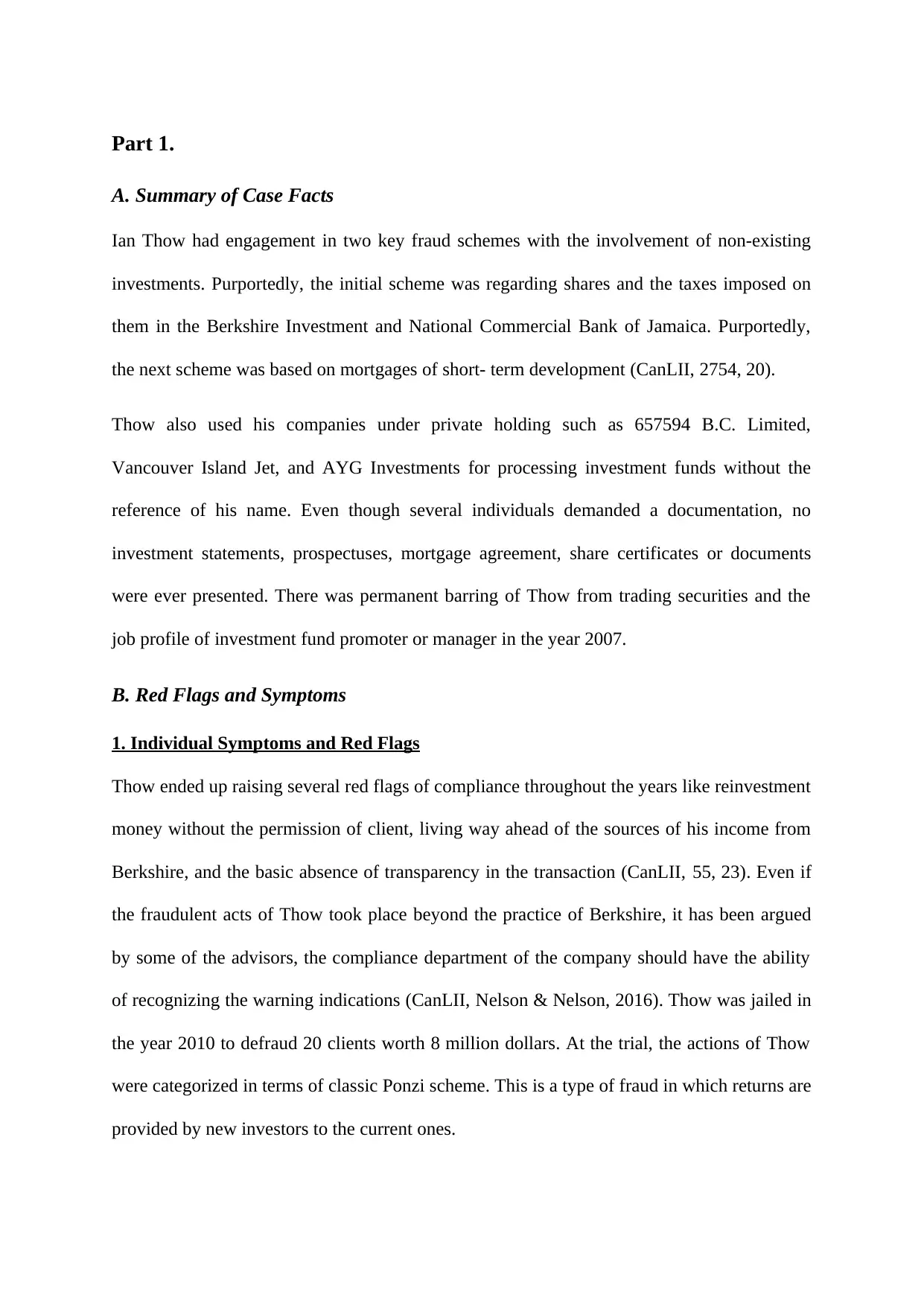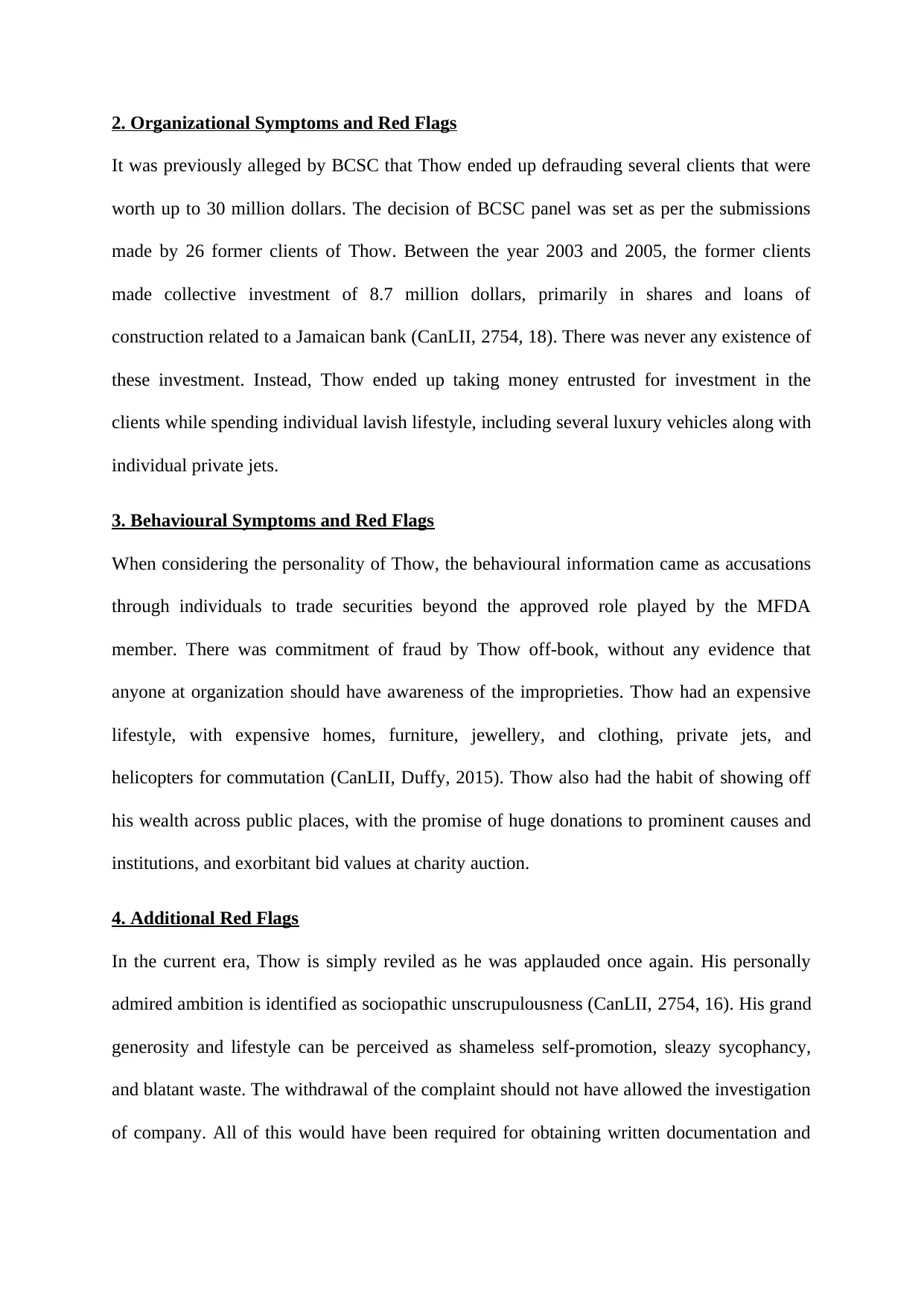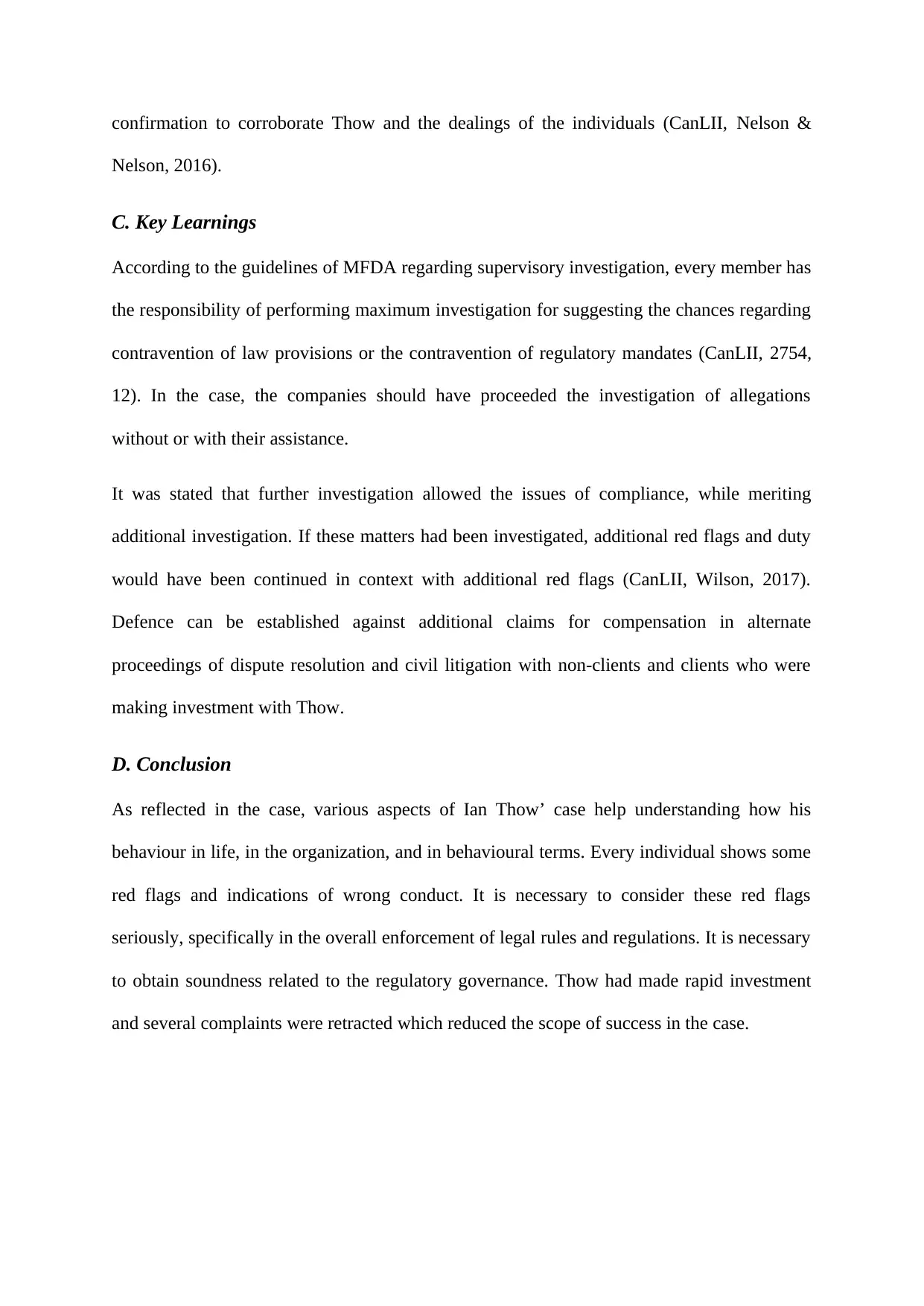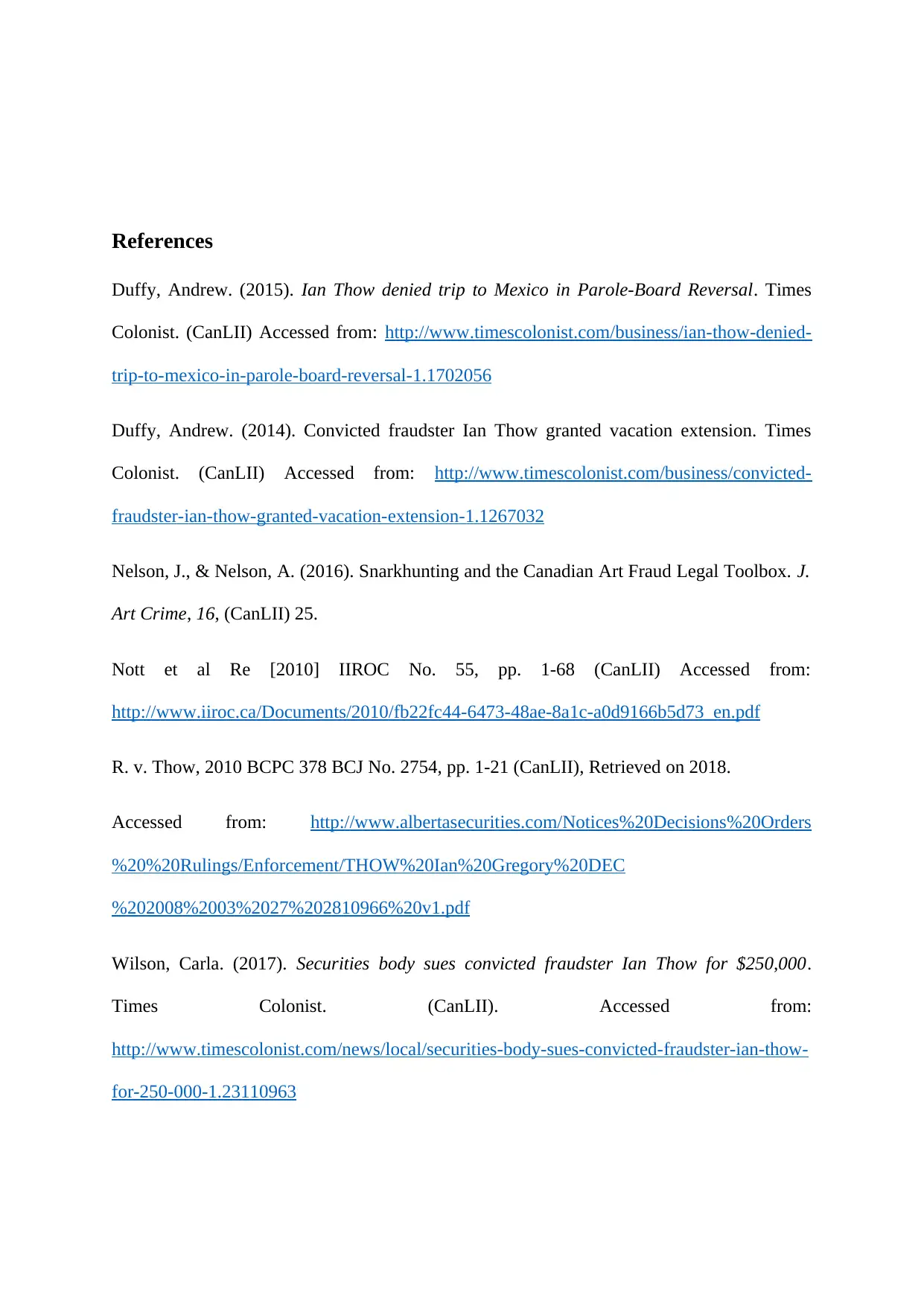ACCT 350 - Ian Thow Fraud Case: Red Flags and Lessons Learned Analysis
VerifiedAdded on 2023/06/15
|4
|1109
|147
Case Study
AI Summary
This case study provides an analysis of the Ian Thow fraud case, focusing on the red flags and lessons learned from his schemes involving non-existing investments. It summarizes the case facts, including Thow's fraudulent activities related to shares, taxes, and mortgages, as well as his use of private holding companies to process investment funds. The analysis identifies individual, organizational, and behavioral red flags, such as Thow's lavish lifestyle, lack of transparency, and disregard for compliance. Key learnings emphasize the responsibility of companies to investigate allegations of contravention of law and regulatory mandates. The case study concludes by highlighting the importance of recognizing and addressing red flags to enforce legal rules and regulations, referencing MFDA guidelines and relevant case law.

Part 1.
A. Summary of Case Facts
Ian Thow had engagement in two key fraud schemes with the involvement of non-existing
investments. Purportedly, the initial scheme was regarding shares and the taxes imposed on
them in the Berkshire Investment and National Commercial Bank of Jamaica. Purportedly,
the next scheme was based on mortgages of short- term development (CanLII, 2754, 20).
Thow also used his companies under private holding such as 657594 B.C. Limited,
Vancouver Island Jet, and AYG Investments for processing investment funds without the
reference of his name. Even though several individuals demanded a documentation, no
investment statements, prospectuses, mortgage agreement, share certificates or documents
were ever presented. There was permanent barring of Thow from trading securities and the
job profile of investment fund promoter or manager in the year 2007.
B. Red Flags and Symptoms
1. Individual Symptoms and Red Flags
Thow ended up raising several red flags of compliance throughout the years like reinvestment
money without the permission of client, living way ahead of the sources of his income from
Berkshire, and the basic absence of transparency in the transaction (CanLII, 55, 23). Even if
the fraudulent acts of Thow took place beyond the practice of Berkshire, it has been argued
by some of the advisors, the compliance department of the company should have the ability
of recognizing the warning indications (CanLII, Nelson & Nelson, 2016). Thow was jailed in
the year 2010 to defraud 20 clients worth 8 million dollars. At the trial, the actions of Thow
were categorized in terms of classic Ponzi scheme. This is a type of fraud in which returns are
provided by new investors to the current ones.
A. Summary of Case Facts
Ian Thow had engagement in two key fraud schemes with the involvement of non-existing
investments. Purportedly, the initial scheme was regarding shares and the taxes imposed on
them in the Berkshire Investment and National Commercial Bank of Jamaica. Purportedly,
the next scheme was based on mortgages of short- term development (CanLII, 2754, 20).
Thow also used his companies under private holding such as 657594 B.C. Limited,
Vancouver Island Jet, and AYG Investments for processing investment funds without the
reference of his name. Even though several individuals demanded a documentation, no
investment statements, prospectuses, mortgage agreement, share certificates or documents
were ever presented. There was permanent barring of Thow from trading securities and the
job profile of investment fund promoter or manager in the year 2007.
B. Red Flags and Symptoms
1. Individual Symptoms and Red Flags
Thow ended up raising several red flags of compliance throughout the years like reinvestment
money without the permission of client, living way ahead of the sources of his income from
Berkshire, and the basic absence of transparency in the transaction (CanLII, 55, 23). Even if
the fraudulent acts of Thow took place beyond the practice of Berkshire, it has been argued
by some of the advisors, the compliance department of the company should have the ability
of recognizing the warning indications (CanLII, Nelson & Nelson, 2016). Thow was jailed in
the year 2010 to defraud 20 clients worth 8 million dollars. At the trial, the actions of Thow
were categorized in terms of classic Ponzi scheme. This is a type of fraud in which returns are
provided by new investors to the current ones.
Paraphrase This Document
Need a fresh take? Get an instant paraphrase of this document with our AI Paraphraser

2. Organizational Symptoms and Red Flags
It was previously alleged by BCSC that Thow ended up defrauding several clients that were
worth up to 30 million dollars. The decision of BCSC panel was set as per the submissions
made by 26 former clients of Thow. Between the year 2003 and 2005, the former clients
made collective investment of 8.7 million dollars, primarily in shares and loans of
construction related to a Jamaican bank (CanLII, 2754, 18). There was never any existence of
these investment. Instead, Thow ended up taking money entrusted for investment in the
clients while spending individual lavish lifestyle, including several luxury vehicles along with
individual private jets.
3. Behavioural Symptoms and Red Flags
When considering the personality of Thow, the behavioural information came as accusations
through individuals to trade securities beyond the approved role played by the MFDA
member. There was commitment of fraud by Thow off-book, without any evidence that
anyone at organization should have awareness of the improprieties. Thow had an expensive
lifestyle, with expensive homes, furniture, jewellery, and clothing, private jets, and
helicopters for commutation (CanLII, Duffy, 2015). Thow also had the habit of showing off
his wealth across public places, with the promise of huge donations to prominent causes and
institutions, and exorbitant bid values at charity auction.
4. Additional Red Flags
In the current era, Thow is simply reviled as he was applauded once again. His personally
admired ambition is identified as sociopathic unscrupulousness (CanLII, 2754, 16). His grand
generosity and lifestyle can be perceived as shameless self-promotion, sleazy sycophancy,
and blatant waste. The withdrawal of the complaint should not have allowed the investigation
of company. All of this would have been required for obtaining written documentation and
It was previously alleged by BCSC that Thow ended up defrauding several clients that were
worth up to 30 million dollars. The decision of BCSC panel was set as per the submissions
made by 26 former clients of Thow. Between the year 2003 and 2005, the former clients
made collective investment of 8.7 million dollars, primarily in shares and loans of
construction related to a Jamaican bank (CanLII, 2754, 18). There was never any existence of
these investment. Instead, Thow ended up taking money entrusted for investment in the
clients while spending individual lavish lifestyle, including several luxury vehicles along with
individual private jets.
3. Behavioural Symptoms and Red Flags
When considering the personality of Thow, the behavioural information came as accusations
through individuals to trade securities beyond the approved role played by the MFDA
member. There was commitment of fraud by Thow off-book, without any evidence that
anyone at organization should have awareness of the improprieties. Thow had an expensive
lifestyle, with expensive homes, furniture, jewellery, and clothing, private jets, and
helicopters for commutation (CanLII, Duffy, 2015). Thow also had the habit of showing off
his wealth across public places, with the promise of huge donations to prominent causes and
institutions, and exorbitant bid values at charity auction.
4. Additional Red Flags
In the current era, Thow is simply reviled as he was applauded once again. His personally
admired ambition is identified as sociopathic unscrupulousness (CanLII, 2754, 16). His grand
generosity and lifestyle can be perceived as shameless self-promotion, sleazy sycophancy,
and blatant waste. The withdrawal of the complaint should not have allowed the investigation
of company. All of this would have been required for obtaining written documentation and

confirmation to corroborate Thow and the dealings of the individuals (CanLII, Nelson &
Nelson, 2016).
C. Key Learnings
According to the guidelines of MFDA regarding supervisory investigation, every member has
the responsibility of performing maximum investigation for suggesting the chances regarding
contravention of law provisions or the contravention of regulatory mandates (CanLII, 2754,
12). In the case, the companies should have proceeded the investigation of allegations
without or with their assistance.
It was stated that further investigation allowed the issues of compliance, while meriting
additional investigation. If these matters had been investigated, additional red flags and duty
would have been continued in context with additional red flags (CanLII, Wilson, 2017).
Defence can be established against additional claims for compensation in alternate
proceedings of dispute resolution and civil litigation with non-clients and clients who were
making investment with Thow.
D. Conclusion
As reflected in the case, various aspects of Ian Thow’ case help understanding how his
behaviour in life, in the organization, and in behavioural terms. Every individual shows some
red flags and indications of wrong conduct. It is necessary to consider these red flags
seriously, specifically in the overall enforcement of legal rules and regulations. It is necessary
to obtain soundness related to the regulatory governance. Thow had made rapid investment
and several complaints were retracted which reduced the scope of success in the case.
Nelson, 2016).
C. Key Learnings
According to the guidelines of MFDA regarding supervisory investigation, every member has
the responsibility of performing maximum investigation for suggesting the chances regarding
contravention of law provisions or the contravention of regulatory mandates (CanLII, 2754,
12). In the case, the companies should have proceeded the investigation of allegations
without or with their assistance.
It was stated that further investigation allowed the issues of compliance, while meriting
additional investigation. If these matters had been investigated, additional red flags and duty
would have been continued in context with additional red flags (CanLII, Wilson, 2017).
Defence can be established against additional claims for compensation in alternate
proceedings of dispute resolution and civil litigation with non-clients and clients who were
making investment with Thow.
D. Conclusion
As reflected in the case, various aspects of Ian Thow’ case help understanding how his
behaviour in life, in the organization, and in behavioural terms. Every individual shows some
red flags and indications of wrong conduct. It is necessary to consider these red flags
seriously, specifically in the overall enforcement of legal rules and regulations. It is necessary
to obtain soundness related to the regulatory governance. Thow had made rapid investment
and several complaints were retracted which reduced the scope of success in the case.
⊘ This is a preview!⊘
Do you want full access?
Subscribe today to unlock all pages.

Trusted by 1+ million students worldwide

References
Duffy, Andrew. (2015). Ian Thow denied trip to Mexico in Parole-Board Reversal. Times
Colonist. (CanLII) Accessed from: http://www.timescolonist.com/business/ian-thow-denied-
trip-to-mexico-in-parole-board-reversal-1.1702056
Duffy, Andrew. (2014). Convicted fraudster Ian Thow granted vacation extension. Times
Colonist. (CanLII) Accessed from: http://www.timescolonist.com/business/convicted-
fraudster-ian-thow-granted-vacation-extension-1.1267032
Nelson, J., & Nelson, A. (2016). Snarkhunting and the Canadian Art Fraud Legal Toolbox. J.
Art Crime, 16, (CanLII) 25.
Nott et al Re [2010] IIROC No. 55, pp. 1-68 (CanLII) Accessed from:
http://www.iiroc.ca/Documents/2010/fb22fc44-6473-48ae-8a1c-a0d9166b5d73_en.pdf
R. v. Thow, 2010 BCPC 378 BCJ No. 2754, pp. 1-21 (CanLII), Retrieved on 2018.
Accessed from: http://www.albertasecurities.com/Notices%20Decisions%20Orders
%20%20Rulings/Enforcement/THOW%20Ian%20Gregory%20DEC
%202008%2003%2027%202810966%20v1.pdf
Wilson, Carla. (2017). Securities body sues convicted fraudster Ian Thow for $250,000.
Times Colonist. (CanLII). Accessed from:
http://www.timescolonist.com/news/local/securities-body-sues-convicted-fraudster-ian-thow-
for-250-000-1.23110963
Duffy, Andrew. (2015). Ian Thow denied trip to Mexico in Parole-Board Reversal. Times
Colonist. (CanLII) Accessed from: http://www.timescolonist.com/business/ian-thow-denied-
trip-to-mexico-in-parole-board-reversal-1.1702056
Duffy, Andrew. (2014). Convicted fraudster Ian Thow granted vacation extension. Times
Colonist. (CanLII) Accessed from: http://www.timescolonist.com/business/convicted-
fraudster-ian-thow-granted-vacation-extension-1.1267032
Nelson, J., & Nelson, A. (2016). Snarkhunting and the Canadian Art Fraud Legal Toolbox. J.
Art Crime, 16, (CanLII) 25.
Nott et al Re [2010] IIROC No. 55, pp. 1-68 (CanLII) Accessed from:
http://www.iiroc.ca/Documents/2010/fb22fc44-6473-48ae-8a1c-a0d9166b5d73_en.pdf
R. v. Thow, 2010 BCPC 378 BCJ No. 2754, pp. 1-21 (CanLII), Retrieved on 2018.
Accessed from: http://www.albertasecurities.com/Notices%20Decisions%20Orders
%20%20Rulings/Enforcement/THOW%20Ian%20Gregory%20DEC
%202008%2003%2027%202810966%20v1.pdf
Wilson, Carla. (2017). Securities body sues convicted fraudster Ian Thow for $250,000.
Times Colonist. (CanLII). Accessed from:
http://www.timescolonist.com/news/local/securities-body-sues-convicted-fraudster-ian-thow-
for-250-000-1.23110963
1 out of 4
Your All-in-One AI-Powered Toolkit for Academic Success.
+13062052269
info@desklib.com
Available 24*7 on WhatsApp / Email
![[object Object]](/_next/static/media/star-bottom.7253800d.svg)
Unlock your academic potential
Copyright © 2020–2026 A2Z Services. All Rights Reserved. Developed and managed by ZUCOL.


